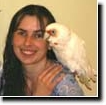WORMS; The Reality
Kristen Reeves, Meadowlark Farms Avian Supply, Inc.
Okay kids. Time for a reality check!
I know some of you think I push Quarterly Quarantine too much, and that your INDOOR birds won't get worms or other issues. I also know some of you tend to be less than timely running your birds through preventive maintenance. But let me show you the REALITY of what can happen if you DON'T!
With permission from the keeper, I'm sharing this story and photos. THIS...THIS RIGHT HERE...is why it is IMPERATIVE you run your birds through at least quarterly. This new keeper hadn't learned about preventive maintenance yet and is not to blame, but YOU GUYS KNOW!!! I HARP ON IT EVERY CHANCE I GET, and I'm NOT going to apologize for that!!! This was a horrible experience for the bird keeper AND the bird. And it was horrible for ME!! I felt completely inadequate in my ability to help this keeper. I don't know that I would have been more help in person, but over the phone is just no way to go about it. Please PREVENT it and don't let this happen to you and your birds!
First, a little background:
I have spent quite a bit of time over the last week helping a new bird keeper with a bird that we at first thought was eggbound. The bird showed ALL the symptoms - paralysis, tremors, fluffing, irritability, not eating/drinking normally. At first, her dried droppings were typical of an eggbound hen - black with yellowish urates. But due to the deep blackness of the droppings, I also considered blood in the droppings due to AGY and/or a protozoal infection. I had the keeper send photos and videos of the bird and its droppings and feel the birds abdomen for signs of an egg. There was no egg in the abdomen, but the fresh droppings appeared protozoa-ish. Without a better way to explain it, they looked lumpy and wet. Exactly what protozoa poop should look like to my trained eye. They looked like what I see HERE when protozoa is present, so I had the keeper treat the bird with Ronivet for 7 days and keep her in a heated hospital cage.
Literally, on day 7 of the Ronivet treatment, a lump that felt like an egg appeared in the abdomen and the bird appeared to be straining to push it out. We were back to believing that in addition to the protozoal issue, the hen was eggbound. I had the keeper switch to aiding the hen by dosing her with calcium, inserting oil into the cloaca to lubricate the egg and help it move, carefully holding her over steam, and keeping the hen in the heated hospital cage. Later in the day, the abdomen ballooned out to huge proportions for a tiny bird - it appeared perhaps there were TWO eggs lodged in the abdomen, but also like the hen was making progress. I shared a video of how to help the hen push the egg out and explained how dangerous it could be, but the hen died before any help could be given. A very sad moment for both the keeper and myself.
Because the keeper needed to know for certain if the hen was eggbound, an attempt was made to expel the egg(s) after the bird's demise - but what came out was NOT an egg. It was a mass of fecal matter and urates. Now, not only did the keeper need to know, but I needed to know what was going on. The keeper sent photos of dropping samples under the microscope, and I walked the keeper through a brief necropsy. What was found was totally unexpected.
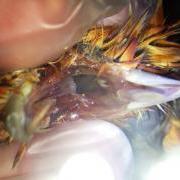
This first photo show the remnants of Trichomonas. Look inside the beak. Back in the throat is a single yellow nodule - a sign of Trich. The bird had completed a full round of Ronivet, yet this single sign remained. It was now obvious there were multiple issues affecting this poor little bird.
The remainder of these photos are a bit fuzzy because they were taken with a cell phone, but it is pretty obvious what is going on here. You can SEE what the result was clearly enough! Yes, those white squiggly things in the center are WORMS.......in an INDOOR bird......resulting in a very painful death. An INDOOR BIRD!!! Are you hearing this??? All you naysayers and procrastinators out there, pay heed! THIS could happen to YOUR birds if you don't get them on a good preventive maintenance schedule! And I promise you, you do NOT want to see this happen.
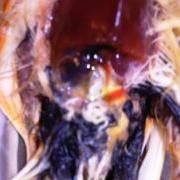
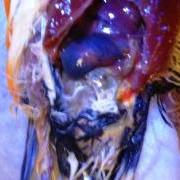
In addition, this bird's liver was pure black, ALL of the internal organs were enlarged, and the entire abdominal cavity was full of green meaning the bird was septic. Whether the black liver is due to the Trichomonas, being overworked due to the worms, or some other issue, remains to be seen. Further fecal sample tests are currently being done to see if we can figure it out to prevent an outbreak in the rest of the flock.
And lastly, this blob is the blockage - the impacted fecal matter - it was prevented from passing due to the buildup of the worms in the bird's system. It is the size of a nickel around. That's HUGE for such a tiny bird.
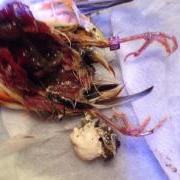
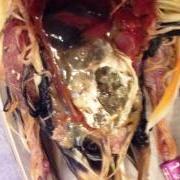
Why put yourself OR your birds through this kind of experience? PLEASE, if you do not have a microscope to view droppings for signs, the skills to accurately read those signs, and cannot guarantee your birds do not have parasites or other health issues, RUN THEM THROUGH A QUARTERLY QUARANTINE for YOUR sake and the sake of your flock!
FINAL WORD...
The information contained here is for reference purposes only. As always, if you suspect your bird is sick, take it to an Avian Veterinarian!




